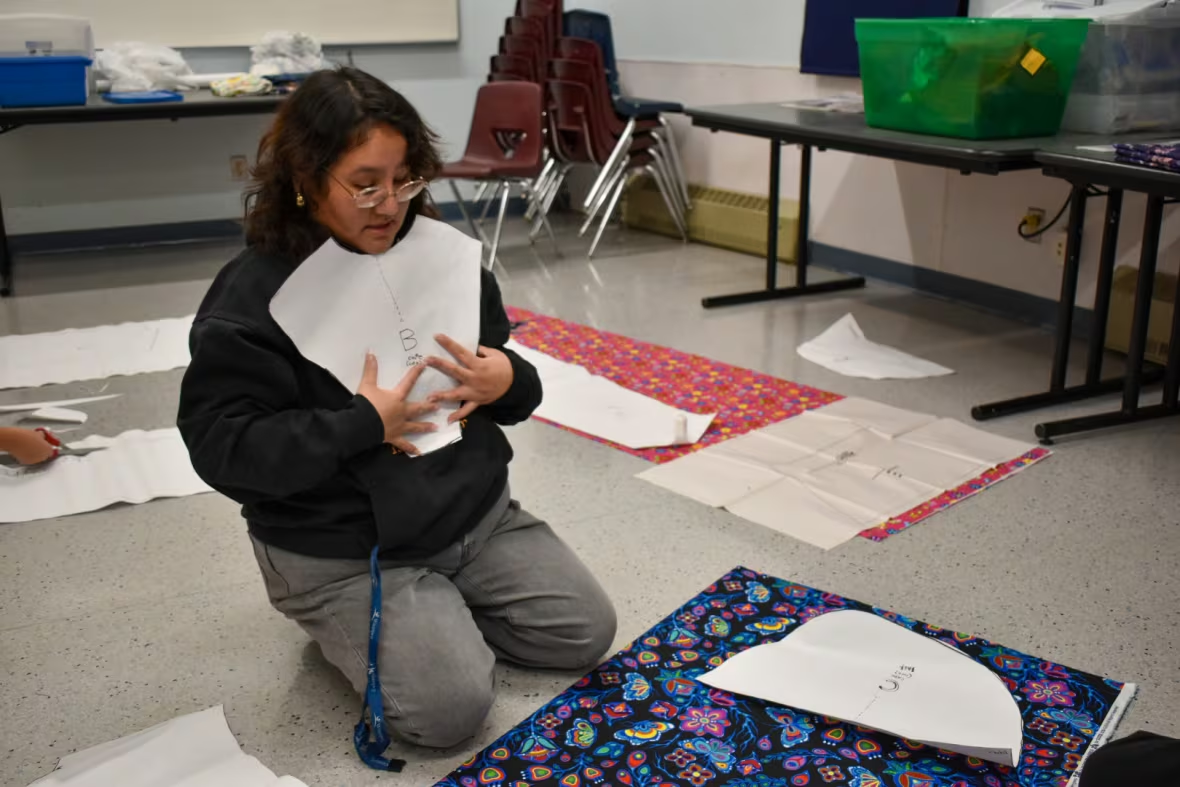Winnipeg powwow club hopes to expand cultural programming in the new year
'I'm just happy that I can reconnect with my culture,' says participant

Kadence Wastesicoot, 13, slices through a piece of pink fabric, cutting out shapes for her new dress.
She and her sisters started coming to the Rising Sun Powwow Club in Winnipeg's North End when she was six, and since then they've learned everything from making regalia to movements for powwow dances.
"I love the drumming and the singing and the dancing," said Wastesicoot.
"I get to learn more about my culture and learn more about how to, like, dance and that by other people who already learned how to."
The ability to connect kids like Wastesicoot directly to traditional teachings is what the club is all about.
Ma Mawi Wi Chi Itata Centre, a Winnipeg-based Indigenous organization aimed at strengthening families and the community, started the club two decades ago when community members in the North End expressed a need for cultural education for children and families.
Natasha Acoby, who took over leading the club in early October, said programs like this helped her connect to her Anishinaabe culture.

"I know it's not a one shoe fits all but because it helped me spiritually, I believe it'll help some of the kids, too," she said.
Acoby sees an identity crisis present in Indigenous communities and said reconnecting with her culture was what helped her find healing.
The club is open to people with all kinds of backgrounds and serves as a way of connecting inner city kids with the culture of powwow dancing.

Currently, the club is working to incorporate more language-based workshops and to have photo shoots of the kids in their self-made regalia. There is even talk of including monthly sweat lodge ceremonies for the participants of the club in the new year.
"I believe if these kids learn about the culture, they'll be able to cope with a more positive way," Acoby said.
Learning from people who know how
The club runs out of two locations: Turtle Island Neighborhood Centre on Thursdays and the McGregor Community Care Site on Fridays. There are two teams of dance instructors, cultural advisors, a drum group and a regalia making workshop. The staff all share the belief that cultural learning is key to healing.

Dance instructor Shyla Boubard from Sagkeeng First Nation said she's been dancing since she was less than a year old, before she could even walk. Now, she gets to teach the kids at the club.
"When I was younger, having a space like this was an outlet for me to come and express my emotions and my feelings," she said.
"So I feel that it's very important to have an outlet like this for the kids so that they can come and express their emotions very freely because of dancing, because of freedom of expression."

Raelen Bighetty attends the McGregor site with her four-year-old daughter and her eight-year-old sister.
"They love to play with the other kids and dance and sing and they're inspired by [Shyla], so they follow her around and try to be, you know, the dancer like she is," she said.

Wastesicoot said learning about traditions "brings happiness."
"I'm just happy that I can reconnect with my culture," she said, before turning her attention back to finishing up her new jingle dress before it's time to start practicing for powwow season.
Ma Mawi Wi Chi Itata has announced plans to build an Indigenous-led family care centre on Larsen Avenue and once that happens they hope to expand their cultural programming.

